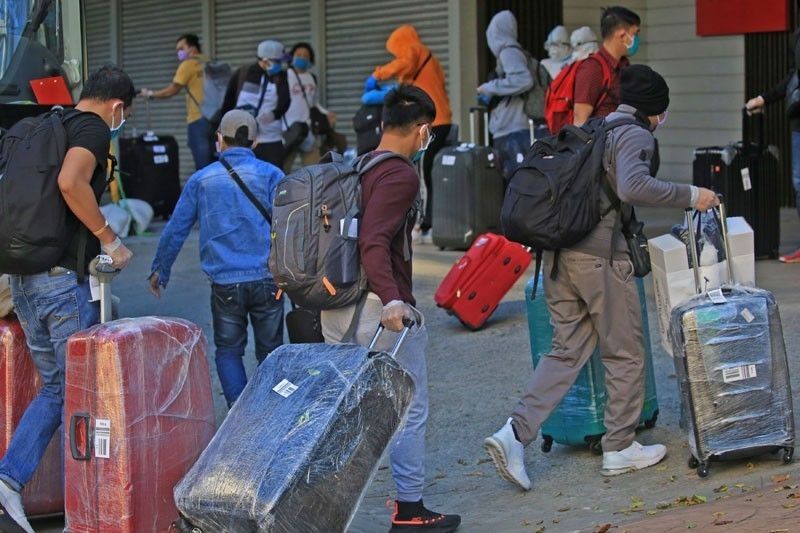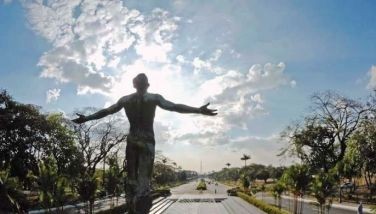DFA set to repatriate 37,000 more OFWs

MANILA, Philippines — Over 37,000 more overseas Filipino workers (OFWs) stranded abroad amidst the coronavirus disease 2019 (COVID-19) pandemic are set to be repatriated in the next four weeks, the Department of Foreign Affairs (DFA) has bared.
During congressional inquiry on the repatriation of OFWs affected by COVID-19 last Friday, DFA Undersecretary for Migrant Workers’ Affairs Sarah Lou Arriola told the House committee on public accounts that they are ready to bring home “as many OFWs as possible.”
“We are planning to bring home, if we are allowed by the CAAP (Civil Aviation Authority of the Philippines), 37,660 overseas workers in the next three to four weeks. The DFA stands ready to bring home as many OFWs as possible but we have to follow also the regulations because we are bound by the flight caps, the number of OFWs that can enter,” Arriola revealed.
She said that 167,626 Filipinos remain stranded in various parts of the world and are in need of assistance and repatriation.
She said that most are located in the Middle East (158,633), followed by those in the Asia-Pacific region (4,083), Africa (3,590), Europe (1,064) and the Americas (256).
At the same hearing, Labor Secretary Silvestre Bello III revealed that the government is set to repatriate the bodies of 301 OFWs who died in Saudi Arabia.
Bello told the House panel that the bodies will be repatriated next week.
The panel conducted the hearing to investigate problems plaguing the repatriation of our workers overseas who have lost their jobs due to the COVID-19 pandemic.
The DFA official, however, clarified that the plan would still depend on whether or not the CAAP and other concerned agencies would allow them to do so.
“We understand the other agencies because the problem is, of course, we do not want them to be stranded in Metro Manila and we thank BCDA (Bases Conversion and Development Authority) that Clark is also receiving OFWs,” she explained.
Arriola said the DFA has so far repatriated over 56,000 OFWs, with 31,000 of them sea-based and 25,000 land-based.
“(Sea-based OFWs) are the ones who are stranded on crew ships and we are making sure that it is going to be very fast because the mental health issues of our seafarers are at stake,” she lamented.
Arriola told lawmakers that Saudi Arabi is the biggest challenge in the repatriation of OFWs due to the size of the country and Filipino government workers who are afflicted with the COVID-19.
“Our POLO OWWA (Philippine Overseas Labor Office – Overseas Workers Welfare Administration), with the indulgence of Bello, in Riyadh is closed down because 14 to 15 of its staff are infected with COVID and unfortunately, our consulate general in Jeddah is on lockdown because there are also infections inside the embassy,” she explained.
The DFA official also cited concerns with DFA’s budget should it proceed with the aggressive repatriation of OFWs.
“The bigger problem also, we have a very high utilization rate and if we continue repatriating aggressively, since we already have 30 to 31 percent of the remaining P1 billion funds for the assistance to nationals, by the end of August or mid-August, we would not have funds for repatriation anymore,” Arriola lamented.
Arriola added that the capacity of other government agencies has to be considered as well in repatriating OFWs.
If DFA will be given enough funding support, Arriola said that “we could ask our embassies and consulates all over the world to give relief pending repatriation.”
The committee also wanted to investigate the problems surrounding those who have already been repatriated but remain stranded inside quarantine facilities, in airports or other places before they could be allowed to go back to their respective provinces.
Bello clarified that repatriation of OFWs is not assured by funding alone as he reminded lawmakers that money is not always the solution to problems.
Bello noted that even bigger funding would not bring home displaced OFWs since there are other equally important factors like the lockdowns imposed by countries where they are working.
According to Bello, lockdown in COVID-affected nations hampers the process even if the Philippines opens its doors to migrant workers amid its own restrictions to stop the spread the coronavirus.
He added another factor to be considered is the legal impediments tied to the exit visas, loans and cases of OFWs who want to go home.
The repatriation of OFWs also becomes difficult when the workers have unsettled loans or face complaints.
During the hearing, House Deputy Speaker and Camarines Sur Rep. Luis Ray Villafuerte pushed for more funds to boost government efforts to bring home the troubled migrant workers.
But Bello maintained that the best solution is “still the tight coordinated efforts of all concerned government agencies and private sector.” Sheila Crisostomo
- Latest
- Trending































